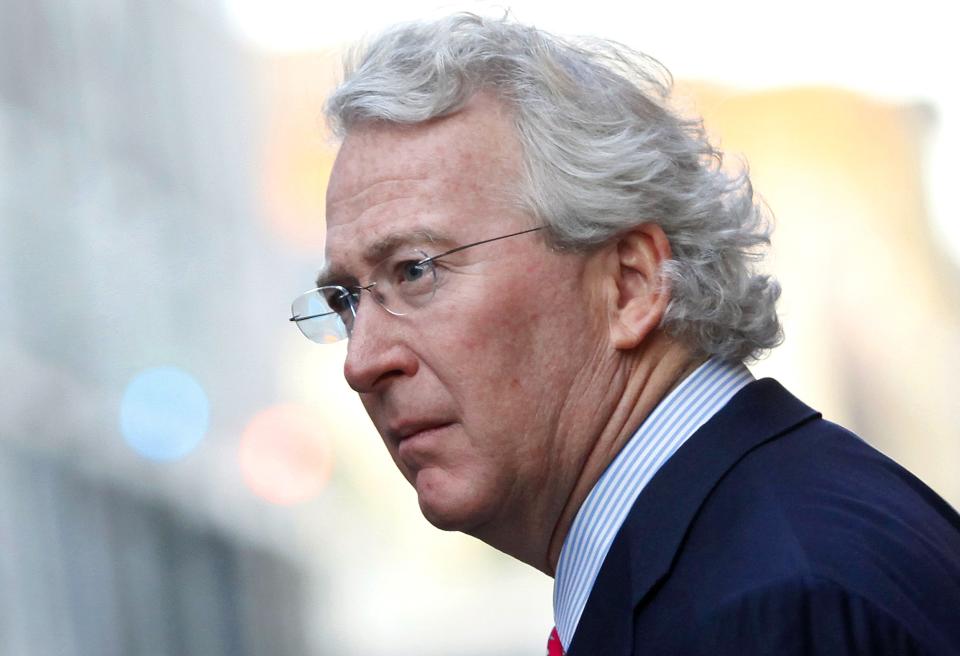'I can't get enough': The legacy of a fracking billionaire who fed on risk
This article was excerpted from “Saudi America: The Truth about Fracking and How it’s Changing the World,” published by Columbia Global Reports on Sept. 11, 2018.
His death, like his legacy, was a hotly contested subject. On March 2, 2016, just after 9:00 a.m., Aubrey McClendon slammed his Chevrolet Tahoe SUV into a concrete viaduct under a bridge on Midwest Boulevard in Oklahoma City, dying instantly. He was speeding, wasn’t wearing a seatbelt, and didn’t appear to make any effort to avoid the collision.
Just one day earlier, a federal grand jury had indicted McClendon for violating antitrust laws during his time as the CEO of Chesapeake Energy. Investigators ultimately ruled it an accident, but rumors of suicide persist to this day. As Captain Paco Balderrama of the Oklahoma City Police told the press, “We may never know one-hundred percent what happened.”

‘I can’t get enough’: An oil tycoon who fed on risk
In the fall of 2008, Forbes had ranked McClendon number 134 on its list of the 400 richest Americans, with an estimated net worth of over $3 billion. But because he borrowed so much money, and secured business loans with personal guarantees, two years after his death, lawyers were still wrangling over the remains of his estate, trying to figure out which debts would be paid—from the $500,000 he owed the Boy Scouts of America to the $465 million he owed a group of Wall Street creditors, including Goldman Sachs.
Wall Street’s vultures—hedge funds that invest in distressed debt—had descended, buying the debt for less than 50 cents on the dollar, essentially rendering a judgment that the claims wouldn’t be paid in full. If McClendon did die broke, it wouldn’t have been out of character. During his years as an oil and gas tycoon, he fed on risk, and was as fearless as he was reckless. He built an empire that at one point produced more gas than any American company except ExxonMobil. Once, when an investor asked on a conference call, “When is enough?” McClendon answered bluntly: “I can’t get enough.”
Many think that without McClendon’s salesmanship and his astonishing ability to woo investors, the world would be a far different place today. Stories abound about how at industry conferences, executives from oil majors like Exxon would find themselves speaking to mostly empty seats, while people literally fought for space in the room where McClendon was holding forth.
“In retrospect, it was kind of like Camelot,” says Henry Hood, Chesapeake’s former general counsel, who worked at Chesapeake initially as a consultant from 1993 until the spring of 2013. “There was a period of time that will never be duplicated with a company that will never be duplicated.”
“Aubrey was a very curious person, and that single trait led him to succeed,” says Marc Rowland, who got to know McClendon in the early 1980s and served as Cheseapeake’s CFO from 1992 to 2010. “A lot of people are driven and smart, but they lack curiosity. Aubrey had that in spades.”
Many people have a far less favorable opinion of McClendon. “Aubrey is irrelevant,” one oil executive tells me. “If you want to tell the American success story, you’ll ignore him. If you want to tell the sad story, write about him.”
A buffoon, a visionary — and a fraud?
Some of his peers, along with some on Wall Street, considered him a buffoon, a con man of sorts, and maybe even a fraud. “He was a catalyst and a visionary, sure, but he tried to kiss all the girls,” says one old-time oil man. “He was a whirling dervish.” “America’s Most Reckless Billionaire,” Forbes once called McClendon, and for many in the industry, that headline defined the man.
But if it was a con, he was conning himself, too. Because he believed. He was, in many ways, the embodiment of a transformation that has changed the face of not just the oil and gas industries but of geopolitics as well.
The contradictions and questions in McClendon’s story continue to reverberate across the industry he did so much to create. You might think of McClendon as a bit of J. R. Ewing, the fictional character in the television series “Dallas,” mixed with Michael Milken, the junk bond king who pioneered an industry and arguably changed the world, but spent several years in prison after pleading guilty to securities fraud. Over and over, I heard the same refrain: “Aubrey epitomizes everything we’re talking about.”
Bethany McLean is a contributing editor at Vanity Fair and bestselling author.
Read more:
Exclusive: Wells Fargo pushed advisors to use high-fee products, cross-sell
Exclusive: Wells Fargo automated high-net-worth wealth management as advisors faced sales pressure


